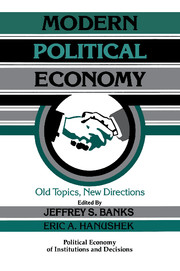Book contents
- Frontmatter
- Contents
- List of contributors
- Series editors' preface
- Preface
- Introduction
- 1 The economics and politics of regulation: perspectives, agenda, and approaches
- 2 Regulatory commitment and utilities' privatization: implications for future comparative research
- 3 The political economy of transformation: liberalization and property rights
- 4 Politics and trade policy
- 5 Elections, party structure, and the economy
- 6 The politics and economics of budget deficit control: policy questions and research questions
- 7 Law, legislation, and positive political theory
- 8 The rational choice theory of social institutions: cooperation, coordination, and communication
- Index
7 - Law, legislation, and positive political theory
Published online by Cambridge University Press: 07 May 2010
- Frontmatter
- Contents
- List of contributors
- Series editors' preface
- Preface
- Introduction
- 1 The economics and politics of regulation: perspectives, agenda, and approaches
- 2 Regulatory commitment and utilities' privatization: implications for future comparative research
- 3 The political economy of transformation: liberalization and property rights
- 4 Politics and trade policy
- 5 Elections, party structure, and the economy
- 6 The politics and economics of budget deficit control: policy questions and research questions
- 7 Law, legislation, and positive political theory
- 8 The rational choice theory of social institutions: cooperation, coordination, and communication
- Index
Summary
INTRODUCTION: LEGISLATION AND LAW
The study of politics is dominated by what might be called a “legislative” view of government. In this view government proceeds largely through enacting general rules to channel social and economic conduct and then using more mundane administrative means to enforce them. This emphasis on legislation encourages us to see other institutions and practices in terms of their connection to or similarity to the legislature. Thus, electoral studies are frequently justified or motivated by their consequences for selecting lawmakers or expressing “mandates” for new laws; presidents are often seen and judged in terms of their role in the legislative process; and administrative agencies and courts are seen as quasilegislative bodies, promulgating general rules and regulations. If the Founding Fathers were wrong to fear congressional dominance of other national institutions, they were perhaps prescient in foreseeing how the legislative model would dominate the way we have come to understand government.
This focus on legislation while, perhaps, natural enough in a democratic nation – statutes are, after all, the principal normatively sanctioned route by which public opinion is translated into public action – produces a distorted description of governmental activity. The centrality of legislative studies suggests that there is a simple relationship between statutes and the law by which we live.
- Type
- Chapter
- Information
- Modern Political EconomyOld Topics, New Directions, pp. 191 - 215Publisher: Cambridge University PressPrint publication year: 1995
- 12
- Cited by



